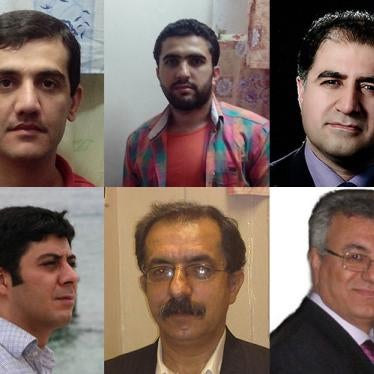(Beirut) – Repressive elements within Iran’s security and intelligence forces and judiciary retained wide powers and carried out serious rights abuses throughout 2014, Human Rights Watch said today in its World Report 2015.
Iran’s powerful security and intelligence forces, aided by a compliant judiciary, have carried out their repressive activities despite hopes for an improvement in the rights situation after Hassan Rouhani became president in August 2013. Officials apparently stepped up their crackdown on dissent through the Internet, with revolutionary courts meting out harsh punishments, including death sentences against bloggers and social media users. Officials also detained or targeted many activists and leading opposition figures, including the 2009 presidential candidates Mir Hossein Mousavi and Mehdi Karroubi, who remained under house arrest without trial. Executions, especially for drug-related offenses, were carried out at an alarming rate.
“Iran’s judiciary and security forces are a major impediment to justice and accountability for victims of rights abuses in Iran,” said Sarah Leah Whitson, Middle East and North Africa director. “Clearly, despite his popular mandate, President Rouhani has little control over their actions. But he can and should do more to show Iranians that he will stand up for human rights and justice.”
In the 656-page world report, its 25th edition, Human Rights Watch reviews human rights practices in more than 90 countries. In his introductory essay, Executive Director Kenneth Roth urges governments to recognize that human rights offer an effective moral guide in turbulent times, and that violating rights can spark or aggravate serious security challenges. The short-term gains of undermining core values of freedom and non-discrimination are rarely worth the long-term price.
In Iran, women and ethnic and religious minorities, including Baha’is, faced discrimination in law and in practice. Iran is also one of the largest prisons for journalists and bloggers in the world, with at least 48 in detention as of October 2014. They included the Washington Post correspondent, Jason Rezaian, whom security agents arrested on July 22 along with his wife, Yeganeh Salehi, also a journalist. Authorities are holding Rezaian without charge and have prevented him from accessing his lawyer. The government also systematically blocks websites and jams foreign satellite broadcasts.
According to official sources, Iranian authorities executed at least 200 prisoners in 2014, though the real number is thought to be over 600. At least eight may have been child offenders who were under 18 at the time of the killings or rapes that led to their death sentences.
Dozens of activists and human rights defenders are in prison because of peaceful or professional activities, including defense lawyers such as Mohammad Seifzadeh and Abdolfattah Soltani who were targeted in part because of their affiliation with Shirin Ebadi’s Center for Human Rights Defenders. Nasrin Sotoudeh, a lawyer who served a prison term on vague national security charges, was banned from practicing law for 10 years following her release from prison in 2013.
In September 2014, a court overturned the ban, but on October 18 the Iranian Bar Association’s disciplinary committee told Sotoudeh that it had revoked her law license for three years because of the conviction.
The government has long denied entry to Ahmed Shaheed, the United Nations special rapporteur on the situation of human rights in Iran.







